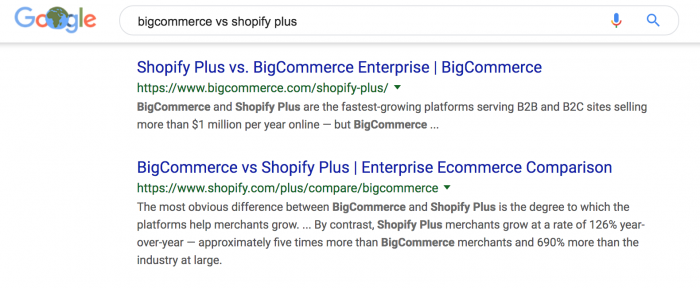The kings of ecommerce, Shopify Plus and BigCommerce Enterprise are generally considered the industry heavyweights when it comes to serving high-traffic, high-sales online stores. So which serves your needs better? Let’s get into it.
I hadn’t gotten but a few minutes into researching this subject when I discovered how direct these platforms are in trading barbs with each other. If you Google “Bigcommerce vs Shopify Plus”, this is what comes up:

Let’s get ready to rumbllllllllllllle!
This Spy Vs. Spy dynamic serves three important purposes, namely 1) it demonstrates the Coke/Pepsi-level dichotomy of this industry, 2) it makes researching this subject way easier, and 3) it’s kinda funny. We’ll hear from the contenders in a minute, but let me start by making a few observations of my own.
The Upper Hand
It seems to me like Shopify Plus, being the more established platform, is going into this on the higher ground. Here are several advantages Shopify is sitting on.
Content Delivery Network and Response Times. This is the big one, a critical point on which Shopify is inarguably better. Shopify has a global delivery network called “Fastly” that runs quickly everywhere on Earth (unless your internet connection sucks, but that’s on you). BigCommerce only has nodes in 10 large cities around the world, which could be a problem if you’re trying to shop one of their stores during the holidays from Des Moines. We Make Websites informs me that “Shopify’s Average response time boasts an average of 45 milliseconds in comparison to BigCommerce Enterprise which averages at 179 milliseconds.”
Customizable Scripts. Plus and Enterprise both bring a lot to the table where customization is concerned. Having things look and work exactly the way the client imagines them is paramount in this industry. Shopify does have an edge on BigCommerce due to its scripts, which allow customization of carts and checkouts.
More Themes For Less Money. It’s true that both platforms offer libraries of themes that are frankly overwhelming in their sheer volume. But Shopify has more to choose from, and BigCommerce’s themes cost about half again as much.
Equal Footing
There are a lot of essential categories where neither platform has the upper hand. Shopify Plus and BigCommerce are both hosted software-as-a-service (SaaS) platforms. They both offer outstanding security that you can trust. Their API systems are great. They offer a vast number of apps and automation integrations. They come with a legion of senior support staff.
Pricing is near impossible to address here because it varies from vendor to vendor based on a wide list of factors. That said, BigCommerce often has a lower final price than Shopify.
BigCommerce’s Rebuttal
Of course, BigCommerce fields a counterargument to Shopify’s claim of superiority. They argue that Shopify’s division between business models makes them weaker and that BigCommerce’s focus on established businesses makes them a better solution for established businesses, while a majority of Shopify’s clientele are smaller and often floundering businesses.
They go on to cite a far higher number of SKU variants, an easier process for creating and scheduling discounts, a native faceted search, customizable URLs, more easily customizable and more complex shipping rates, a more traditional catalog tree, and the ability to host retail and wholesale on a single domain.
Seriously though, read the whole article. It’s too long and complex to tie a neat bow on it here.
Shopify’s Counter-rebuttal
Shopify explicitly comes back and states that a lot of BigCommerce’s native tools and customization actually limits the platform’s reliability. It goes on to cite a much higher annual growth rate among their clients — though this may be because Shopify tends to cater to smaller businesses, which you may remember BigCommerce itself pointed out earlier. They do cite dramatically faster page load times, which is true and a solid hit.
I didn’t agree with a lot of Shopify’s shots at BigCommerce; they felt unfair and invalid. At one point they make the case that BigCommerce’s incredibly efficient support resolution is only testament to their lack of sophistication. Is it really? What do you base that on exactly? If you don’t need to back up accusations with evidence, you can turn any virtue into a vice.
In my experience with Shopify — which I like — their greatest weakness is their support. Let me tell you about the time I spent a half hour on the line while the tech investigated product imports instead of 301 redirects as I asked. She was throwing shade, too:
- 17:36 Shopify: Okay, so it looks like you need to use our template to import your products.
- 17:37 Shopify: The CSV file for product uploads is very specific, and needs to follow this format -https://cdn.shopify.com/s/assets/product_template-783a3f2c6915c42571c5f6dcf2df80ce9e011f280fc68bbe83125f989f9aaf51.csv
- 17:37 Sleepless: I’m not importing products, these are 301 redirects.
- 17:38 Shopify: oof, I clearly don’t have my thinking cap on today
I have to point out though that Shopify has the best documentation I’ve ever seen from a platform, product, or service. It’s been a joy to work with.
Further Reading
I have a few closing thoughts. Most obviously, your specific needs and goals are going to determine which platform is right for you.
That said, I have to take Shopify’s side. All other things being equal, it’s the superior platform. The only way I would flip on the better platform is if I felt like they were exercising immoral business practices. I don’t believe that’s the case here, so I’m with Shopify.
But I’ll temper my endorsement with a word of caution. Shopify Plus and BigCommerce Enterprise launched in February 2014 and May 2015 respectively. Shopify Plus had a 15-month headstart, but BigCommerce is catching up. The history of Silicon Valley has always been written in terms of upsets and falls from supremacy. Remember Muhammad Ali standing over Sonny Liston? The world of technology is like that, over and over. To rest on your laurels is to commit corporate suicide. So be mindful of that.
- We Make Websites — Shopify Plus Vs BigCommerce
- “Shopify Plus is better than BigCommerce.” — Shopify
- “BigCommerce is better than Shopify Plus.” — BigCommerce
Please reach out if you’d like to run a project by us. You can also browse our profile on DesignRush.com where we’re listed as one of the top Shopify Web Designers.
















